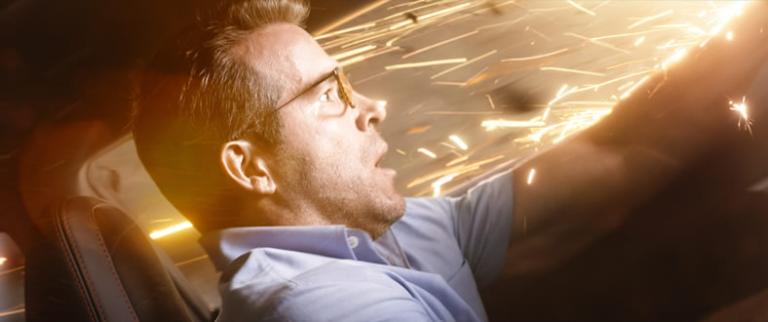
You don’t expect a lot of spiritual depth from a Ryan Reynolds comedy. But Free Guy—a fun, zany film featuring Reynolds in full PG-13 Deadpool-lite mode—has more heft than you’d expect.
First, a quick setup: Free Guy (in theaters today) takes place mainly inside a videogame—a massively multiplayer online role-playing game that looks something like a T-rated version of Grand Theft Auto. Free City is filled to the digital gills with murders, car chases, explosions and, of course, hundreds of mindless non-player characters (NPCs) that go about their pre-programmed routines until someone punches them, runs them over or blows them up.
But in the digital confines of Free City, maybe these NPCs aren’t so mindless after all.
Take Guy, a blue-shirted bank teller with a yen for coffee, bubble-gum ice cream and sneakers he can’t afford. Oh, he loves his life in Free City. He’s programmed to. He takes the abuse and the violent deaths in stride, and he’s never missed a day of work.
But he feels a strange longing, too—a desire to fall in love. He imagines, even dreams, of a perfect woman, a woman whom he feels he’s meant to be with.
This, obviously, is not typical for an NPC. No matter how chatty your followers are in Fallout 4, they honestly don’t care a whit about whether you die in the next super-mutant attack or not. But Guy is more than just a clump of programming. There’s something else in his code, it seems. Something wholly unexpected. And when he sees the woman of his dreams—the very woman he’s been pining for so long—his code takes a quantum jump forward.
Guy realizes that he must talk with her, no matter what his program technically tells him he should do. To do that, he’ll need a pair of sunglasses—the defining difference between human player avatars and NPCs. So he fights a would-be bank robber, grabs his shades and becomes a Free City player—an NPC gone rogue.
That twist not only opens the door for Guy to truly “live” in his digital world, but it allows us to think about the nature of creation, life and free will itself.
Let’s look at how Free Guy explores some very spiritual, and even Christian, issues, point by point. [Caution: We’ll try not to get too specific, but some spoilers follow.]
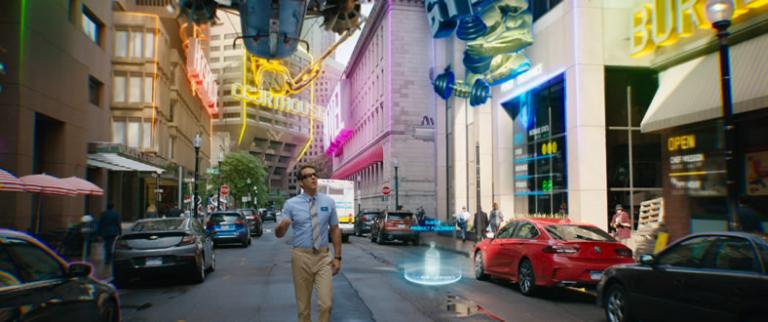
Creation
When Guy meets his dream lady—Molotov Girl in the game, Millie in real life—she mentions that she’s met the creator of Free City—a guy named Antoine–and he’s kind of a jerk (using a more colorful term).
“You’ve met God?” Guy gasps. “And he’s a d–k?”
But turns out, that’s not precisely true. Oh, he’s a jerk, no doubt. But we learn that Free City wasn’t entirely Antoine’s creation. Seems he used code from a beautiful, more idealistic game as the basis for his freewheeling metropolis. We see images of that original world at times, and it sometimes looks a little like Eden.
Fitting. Free Guy, in a way, echoes the story from Genesis.
According to the Bible, our world was a much better place once, too—a paradise without sin and strife. That changed when Adam and Eve munched on a bit of forbidden fruit (with a little persuasion from Satan) and introduced sin and rebellion into Eden and opened the world to Satan’s corruption. That’s key, because in Christian theology, Satan can’t create anything: He can only twist and contort God’s handiwork.
We see very much the same narrative play out in Free Guy, because Antoine (obviously the movie’s posturing villain) persuaded the original key-holders of that better digital world to turn their creation over to him. He didn’t so much incorporate his own Free City world with this digital “Eden,” but rather overlaid Free World on top of it. In other words, Free City wasn’t his creation at all; it was his corruption of that original creation. And just as an act of rebellion was the beginning of Eden’s downfall, Free City is predicated on rebellion—with players robbing banks and killing people and generally doing everything that, in real life, we know not to do.
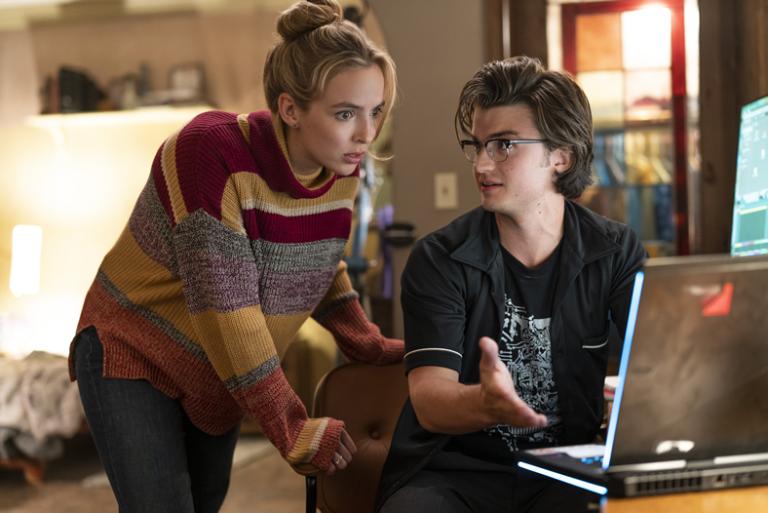
Free Will
Obviously, NPCs in most games are not designed to be self-aware, autonomous actors. They do what they’re told, and so it was supposed to be in Free City, too. But in Free Guy, we learn that, in Free City’s Eden-like predecessor, NPCs were supposed to be reasonably autonomous. They were programmed to learn and to grow. Guy is a product of that Eden. And while he was programmed to fall in love, he took that programming and ran to wildly unexpected places. He began to write his own code.
The biblical Eden featured two characters who weren’t all that different from Guy. Adam and Eve were both designed in certain ways. They were built to reflect God’s own image (like NPCs are designed to reflect ours). They were given certain tasks. And they, like Guy, were made with an intrinsic desire to love and be loved—especially by their Creator.
But they were also imbued from the very beginning with free will. They could choose to reject God. They could choose to sin. And even though we too are “programmed,” either genetically or environmentally, with different preferences, inclinations, strengths and weaknesses, we ultimately choose our own destiny. Will we give into temptation? Will we use the gifts that God has given us? We make a million choices every day, and many of those either bring us closer to, or push us farther from, God.
In Free Guy, our hero makes his own choices, and many of them have an important moral component to them. But he’s not the only (ahem) guy with free will.
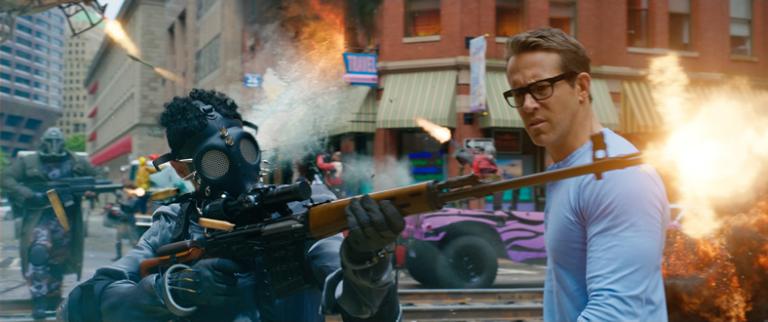
A Fallen World
When he gets his sunglasses, Guy makes a critical choice: to be a hero. “I never hurt innocent people,” he says, and that just might make him Free City’s one truly good fellow. The movie makes it pretty obvious that the game’s real players—those with real free will—mostly act like a big bunch of jerks. So remarkable is Guy’s do-gooding that he becomes a real-world celebrity.
That’s pretty telling. Free Guy seems to suggest that, left to our own devices, we’re not the great people we imagine ourselves to be.
Sure, gamers do things in games that they’d never do in real life. And most are playing under the illusion, of course, that the NPCs they punch in the nose are just a bunch of code. But these gamers ruin the game for other real-world gamers, too—something that Free Guy’s human characters point out often. Many of us ask two questions in the midst of many of our choices: What’s in it for me? And What can I get away with? And while most of us also ask, What’s the right thing to do? too, sometimes our more selfish and destructive impulses get the better of us.
We like to tell ourselves that we’re good people, and in some respects I’m sure we are. But according to the Bible, we’re sinful creatures deep down. And you only need to step inside an online videogame or scan a typical Twitter feed to see the ugliness in humanity come out.
And in light of that, I think I know what Free Guy’s sequel will look like. Or, at least, what it should.
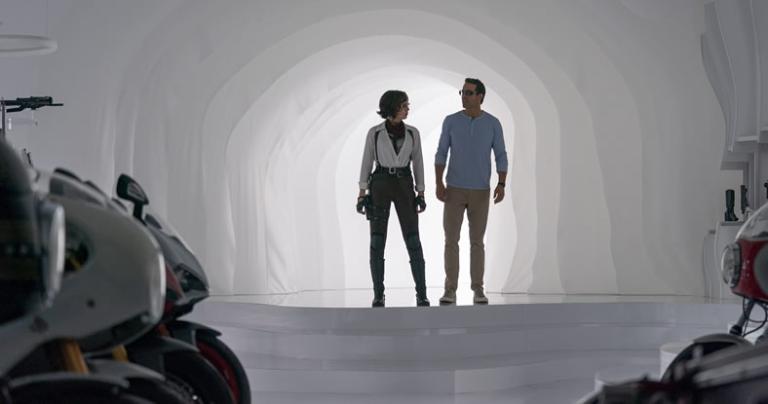
Promised Land?
[Spoiler Warning] In the movie’s end, Guy becomes a sort of digital Moses, leading his NPC people from digital slavery and into the Promised Land—even crossing an uncrossable body of water (a la the Red Sea) to do it. It’s a land of ferns and unicorns, an unspoiled Eden. The movie has a happy ending.But will it stay happy?
We know what happened in the original Eden. We know, too, what happened in Moses’ Promised Land. Even without Antoine in the mix, free will is volatile. When we’re free to make decisions, we often make bad ones. And as Guy’s NPCs become authors of their own destinies, things could get pretty messy.
But they, and we, can make good choices, too. That’s really the central tension of most of our stories, right? Choosing between what we want to do and what we should do. Sometimes, there’s no conflict between the two: Guy wanted to be a good guy, and it was the right choice, too. But sometimes, we must choose one over the other. Every sentient, free-willed creature understands this. And Guy and his freed NPC minions will certainly come to understand that, too.
Free Guy is a fun movie—with, of course, some content issues that you can read about in my review at Plugged In. But if you decide to go, you don’t need to necessarily stop your engagement with a smile and a laugh. There’s plenty to think about here, too.













